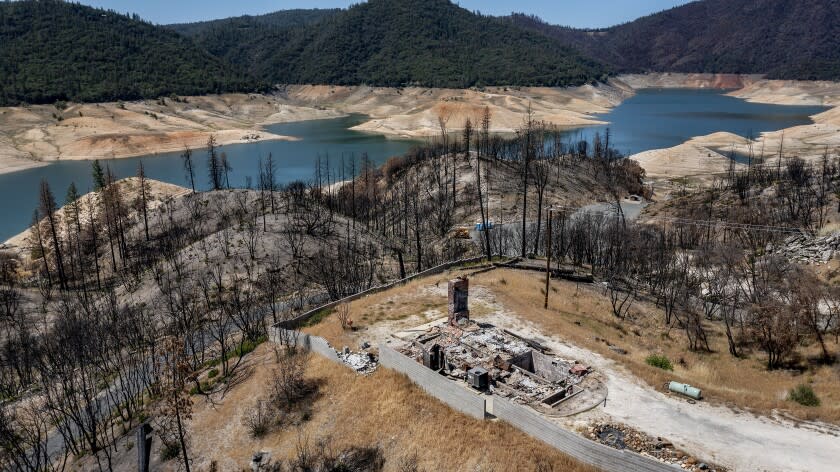Letters to the Editor: We're sucking California dry. Stop, or our kids will inherit a hellscape

To the editor: In his book "The Ocean of Life," Callum Roberts describes decades of photographs at one Key West sports-fishing outfit. Over the years, the size of the fish in the photos shrink, but the smiles of the anglers remain "as broad today as they were in the 1950s." The point is that as the oceans slowly change, today's generation has no idea that anything is amiss. ("Extreme heat, drought will permanently scar California and its social fabric," June 30)
Now, we have acres of dead trees in the Sierra Nevada, extremely low reservoirs and other very visible signs that something is not right. The warning signs have been around for decades, yet we continue to fight the science and ignore the evidence that our landscape is changing.
Cases in point: On the day the L.A. Times published this great story on aridification, the U.S. Supreme Court made it much more difficult for the federal government to regulate greenhouse gas emissions from power plants.
What aridification truly means is a dramatic change to our way of life. Farm acreage likely will shrink with reduced water supplies, yet large farming interests will fight to keep the faucets open at full blast because of their historic entitlement and rightful concern about impacts to the local economies.
But if they choose to reduce their water intake now and fallow a portion of their land, they ultimately may be able to extend their farming operations for much longer. It's not an easy choice, but taking as much water as entitled now only means a "dry faucet" will arrive sooner.
The warning signs have been around for nearly 100 years. What we need are hard decisions at the policy and personal levels, so our kids and grandchildren can still live in California.
Denis Wolcott, Long Beach
The writer is a former communications manager for the Metropolitan Water District of Southern California who now represents other water agencies.
..
To the editor: The aridification of California is an emergency. The first Los Angeles Aqueduct was completed in 1913 to serve a population that was small compared to today. Why not build an aqueduct to the Pacific Northwest where there is an abundance of water?
Humans cannot live without water. As long as people live here and housing construction continues, it is imperative that we have additional sources of water. Why has the state not initiated, before the crisis even began, building desalination plants up and down the coast?
In my area of Southern California, we have been allotted insufficient amounts of water to keep our landscaping alive. We live in a high-fire danger zone. How does this make sense?
In California, the majority of water usage is from agricultural and commercial use. Urban and residential use is a small portion of consumption, yet we are being forced to cut our usage significantly while the largest consumers continue to use almost all of our resources. This is inequitable and unjust.
California's budget surplus is $97 billion. Why is this money not being used to mitigate these serious water shortage problems?
Stephanie Kirschner, Agoura Hills
..
To the editor: Yes, the Great Drought hundreds of years ago may have been great enough to shut down a civilization in the 1200s, but it took our advanced civilization to kill 4,000-year-old bristlecone pines. Oh, and giant sequoias too.
Aren't we humans, particularly Americans, the apple of God's eye?
A.D. Wahl, Port Hueneme
This story originally appeared in Los Angeles Times.

